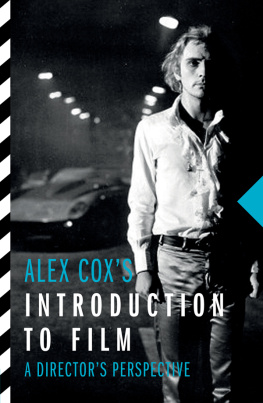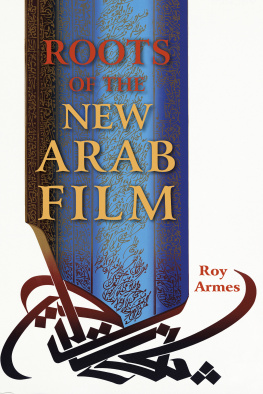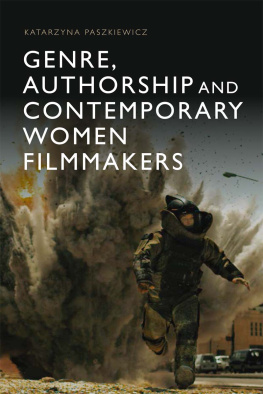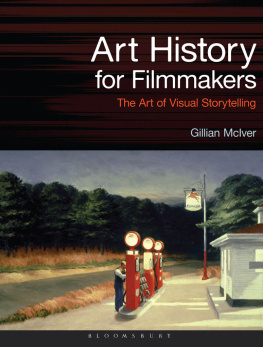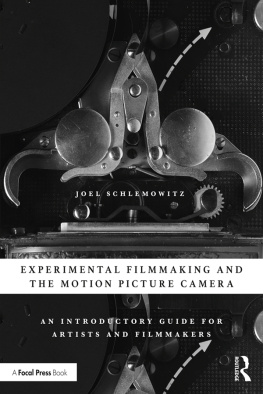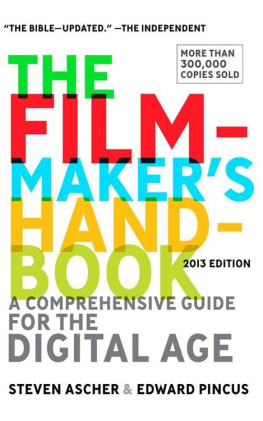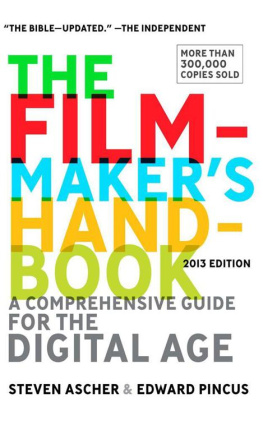Contents
Guide
Picasso apparently said, When critics get together, they talk about theory. When painters get together, they talk about turpentine. That has been my experience, as far as film and film studies are concerned. Critics, academics, and theoreticians talk theory. That is what they know. Artists talk about their processes in making art. This is my attempt to apply what I know to a beginning study of film.
Emerging filmmakers need to know the basics of their art form: the language of the camera, and lenses, the different crew roles, the formats, the aspect ratios. They also need to know some bare-bones theory: what an auteur is, what montage is, what genres are. Words like these are our currency: they must be known. But, even more urgently, young filmmakers need answers to their questions -- what lens was used? How did they do that effect? Who paid for that picture? How did they get it past the censor?
Most important, all filmmakers require serious grounding in film. You cannot be a great artist if you arent versed in great art. And this doesnt just apply to the cinema. My book is for aspiring filmmakers, but also for students, and for people generally interested in grounding themselves in this particular art form - from a filmmakers perspective.
I believe 100% that a reasonably educated and intelligent person in any country of the world should be able to have a conversation about Luis Buuel, about Akira Kurosawa, about Stanley Kubrick, about Fellini or Bergman, and talk knowledgeably about at least one of their films. Read this book, watch the films, and you can!

Maverick British filmmaker Alex Cox is responsible for directing a host of acclaimed films from Sleep Is for Sissies, Repo Man, Sid & Nancy, Straight to Hell, Walker and Highway Patrolman to Death and the Compass, Revengers Tragedy and Searchers 2.0. From 1987 to 1994, he presented the acclaimed BBC TV series Moviedrome, bringing unknown or forgotten films to new audiences. Hes also the author of X Films: True Confessions of a Radical Filmmaker, and has written on the subject of film for publications including Sight and Sound, The Guardian, The Independent and Film Comment.
kamera
BOOKS
kamerabooks.com
ALEX COXS
INTRODUCTION
TO FILM
A DIRECTORS PERSPECTIVE
kamera
BOOKS
For Ernesto
CONTENTS
When critics get together, they discuss theory.
When painters get together, they discuss turpentine
Picasso
INTRO TO INTRO
This short book is meant to serve as an introduction to film for someone who hasnt thought a lot about the subject, but is interested. To get the full benefit, you should break off from reading the book to watch the films when indicated as if we were in a lecture theatre, or a screening room, together, and my harangue segued naturally into the dimming of the lights and the projection of the film.
Academics have a very specific take on things, and a language of their own. That take and that language arent mine. Im a film director, writer, actor and producer. So my intro to film may be somewhat different from the standard introductory text. I am less focused on film theory, and more on a films meaning, the intentions of the filmmaker, and how they got their film made.
I was inspired to write this book because my friend at the University of Colorado (Boulder), Ernesto Acevedo-Muoz, asked me to teach Intro to Film in my last semester there. Till then Id taught only film production classes acting and directing, production, screenwriting and the thought of teaching a critical studies class filled me with fear. But then, I reasoned, its only one class; whatever harm I do can be remedied by my colleagues later, and how often does an undergraduate get to hear a film director rant on a subject so broad and yet so amazingly intimate?
This book is the result of that class. Its format is very similar to a 16-week lecture course. It includes two guest lectures, one by Professor Susan Nevelow Mart, head of the Law Library at CU, and the other by my dear friend, spouse, and co-worker, Tod Davies. Thank you, Neff and Tod. All our lectures would have been grim indeed without the spirited projections of Victor Jendras and Hannah Pike. Thanks to Hannah and Victor, too, and to Jacob Barreras for finding the impossible, many times. And thanks to Pabljo Kjolseth, especially, for providing via the International Film Series what every film school needs: a repertory cinema programming classic and modern features from around the world.
Remember! This book will only make sense if you watch the films! Some you must see in their entirety. Others (mine, for instance) you can watch a portion of and skip the rest (I dont give an exact timing for a sequence as it varies from DVD to DVD and region to region. Instead I identify the scene for example, the Battle on the Ice from Alexander Nevsky so you can simply search for it on DuckDuckGo, or find it in the DVD chapter menu). But most of the films I cite and the directors discussed are really good. These are films worth watching, ideally in the cinema, or at least on as large a screen as possible, in a dark room, never hitting the pause button.
Most of the films discussed here are easy to find. Some are classics, readily available on DVD, to stream, or as downloads. Some are in the public domain and available for free. Others are hard to find who distributes The Mattei Affair? Or Toby Dammit? In the US, Rojo Amanecer and La Ley de Herodes are only available on compilation DVDs with bizarre titles. In these cases, ingenuity is required. If you really are unable to find a film discussed in these pages, email me at and Ill do my best to assist.
CONTEXT, MISE EN SCNE, AUTEUR THEORY AND THE TWENTIETH-CENTURY TIMELINE
We watch the title sequence of The Wild Bunch (USA, 1969)
because its an exemplary title sequence, because it sets up the films conflict (outlaws versus railroad bounty hunters, all of whom are living on borrowed time), because the uniformed hero-villains who are about to provoke a massacre arent just a cinematic invention but a reference to the films context the ongoing massacre in Vietnam and because the sequences heroic conclusion (If they move, kill em!/freeze-frame on the heros face/title: Directed by Sam Peckinpah) is about as clear a celebration of the auteur director as you could ever get.
Whats an auteur? You probably have an idea, but lets ask some even more basic questions first. What do we mean when we say a film? A sequence of moving images that tells a story? Why is it called a film? Once, all movies were shot on film. Now many of them are shot, and screened, on digital video. Yet we still call them films. And if they last around 80 minutes, or longer, we call them feature films. (What is the difference between a film and a movie? This was explained to me by the Hollywood director Michael Mann. Tod Davies and I had met him to propose an adaptation of Cormac McCarthys novel Blood Meridian. Mann listened to our proposal, and turned it down. What youre talking about is a film, he said. I make movies. It had not occurred to me, till then, that there was any difference. I asked what the difference between a film and a movie was. About 60 million dollars, Mann replied.)

